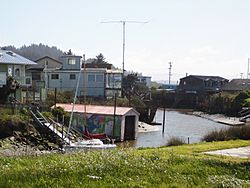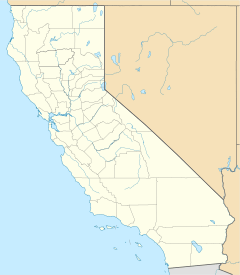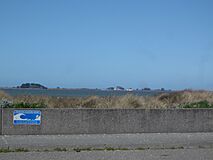King Salmon, California facts for kids
Quick facts for kids
King Salmon
|
|
|---|---|

Houses are built along canals in King Salmon
|
|
| Country | United States |
| State | California |
| County | Humboldt County |
| Elevation | 3 ft (1 m) |
King Salmon is a small community in Humboldt County, California, United States. It is located right on the coast, on a spot called Buhne Point. This area is directly across from the entrance to Humboldt Bay.
King Salmon is a little south of Eureka. It is also about 1 mile (1.6 km) north of Fields Landing. The community sits very close to the ocean, only about 3 feet (1 meter) above sea level. Even though it's outside Eureka's city limits, it shares Eureka's zip code and area code. It is considered part of the larger Eureka area.
Life in King Salmon
King Salmon was once a small place mainly for fishing. People used to have summer homes or vacation houses here. Today, it is mostly a residential community where people live all year round.
This community was also the former location of the Humboldt Bay Nuclear Power Plant. Now, it is home to the Sequoia Humane Society. This group runs a privately funded no-kill shelter for dogs and cats. They even host a fun event called "Woofstock" every year in Eureka's Halvorsen Park.
Community Services and Features
King Salmon has several useful services for its residents and visitors. The Redwood Transit System provides bus service to the area. This makes it easier for people to get around.
The community also offers marina services. This means there are facilities for boats and boat owners. There is also a recreational vehicle (RV) park for people traveling in RVs. A public picnic area is available on top of Buhne Point. This spot is right next to where the power plant used to be.
Protecting the Shoreline
The shoreline at King Salmon faces natural erosion from the ocean. To help protect the land, a special structure called a groin was built in 1983. A groin is like a wall that sticks out into the water. It helps to slow down the movement of sand and prevent the beach from washing away. After the groin was built, more sand was added to create a wider beach.



